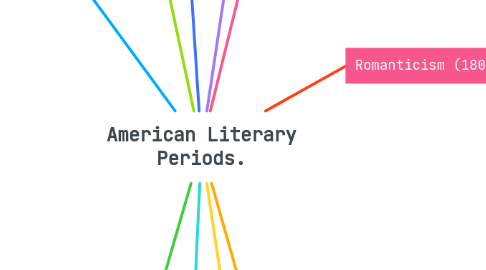
1. Anti-Transcendentalism (1830-1880)
1.1. BOOKS
1.1.1. Also called Gothic Literature. •As opposed to Transcendentalism, which focused on the natural world and its relationship to humanity, and the quest for understanding of the human spirit, Anti-Transcendentalism focused on the limitations of mankind, and its potential destructiveness of the human spirit. For instance, water brings life, but its excess, i.e. a flood, can bring death and destruction.•Acknowledged sin, pain, and evil•Supernatural forces were common
1.1.1.1. THE MOST INFLUENTIAL WRITERS IN THIS PERIOD
1.1.1.2. Nathaniel Hawthorne
1.1.1.3. Herman Melville
1.2. THE HOUSE OF THE SEVEN GABLES
1.3. TWICE-TOLD TALES
1.4. A WONDER BOOK AND TANGLEOOD TALES
1.5. THE MINISTER`S BLACK VEIL
2. Postmodernism /Contemporary 1950-present
2.1. Authors are writing in a plethora of genres. •There are more different types of writing being done at one time than at any other period in history: fantasy, fiction, science fiction, horror, political writings, romantics, plays, and poems, anything and everything
2.1.1. THE MOST INFLUENTIAL WRITERS IN THIS PERIOD
2.1.1.1. BOOKS
2.1.1.2. blonde
2.1.1.3. the lost landscape
2.1.1.4. breathe
2.1.2. J. D. Salinger
2.1.3. Stephen King
2.1.4. Joyce Carol Oates
3. Modernism 1900-1950
3.1. One of the most experimental types of writing. •Modernist authorsused fragments, stream of consciousness, and interior dialogue. The main thing that authors were trying to achieve with Modernism was a unique style, one for which they could stand out
3.1.1. During this period Technology was taking incredible leaps and two World Wars took place; there was destruction on a global scale. The younger generation began to take over the main stage
3.1.1.1. THE MOST INFLUENTIAL WRITERS IN THIS PERIOD
3.1.1.1.1. Ernest Hemingway
3.1.1.1.2. F. Scott Fitzgerald
3.1.1.1.3. john Steinbeck
3.1.1.1.4. Robert Frost
4. Realism (1850-1900)
4.1. BOOKS
4.1.1. Took place during the Civil War. At a time when a war was taking place, people were tired of Transcendentalism and Anti-Transcendentalism. For one thing they were both extremes of the same spectrum: one was nice and happy and “frilly;” the other was dark and destructive. People wanted to see things how they were, so Realism came about.•Realism also came about as a reaction to Romanticism, in which there were heroic characters, and adventures, with strange and unfamiliar settings
4.1.1.1. THE MOST INFLUENTIAL WRITERS IN THIS PERIOD
4.1.1.2. Mark Twain [Samuel Clemens
4.1.1.3. Bret Harte
4.1.1.4. Sarah Orne Jewett
4.1.1.5. James Henry
4.2. SECRET AND SACRED
4.3. THE COMPLETE COLLECTION
4.4. THE AMERICAN
5. Regionalism (1865-1915)
5.1. Subset of Realism•Authors would write a story about specific geographical areas. By writing about regions the authors explore the culture of that area, including its languages, customs, beliefs, and history
5.1.1. THE MOST INFLUENTIAL WRITERS IN THIS PERIOD
5.1.2. William Faulkner - Kate Chopin -Frank Norris
6. Naturalism (1865-1915)
6.1. BOOKS
6.1.1. Subgenre of Realism•Viewed people as hapless victims of immutable natural laws. Free will is an illusion, and things that happen in the universe, happen and could not happen any other way.•A defining characteristic of Naturalism is that its characters’ lives are shaped by forces they cannot control.
6.1.1.1. THE MOST INFLUENTIAL WRITERS IN THIS PERIOD
6.1.1.2. Jack London
6.1.1.3. Theodore Dreiser
6.1.1.4. Frank Norris
6.2. WHITE FANG
6.3. THE CALL OF THE WILD
6.4. HEARTS OF THREE
7. Transcendentalism (1830-1880)
7.1. BOOKS OF TRANSCENDENTALISM
7.1.1. Subgenre of Romanticism•Stressed individualism, maturity and self-reliance. •Authors used nature to gain knowledge or to return to a life of self-reliance and individualism. •Also stressed the fundamental idea of a unity between God and the world, that each person was a microcosm for the world.
7.1.1.1. THE MOST INFLUENTIAL WRITERS IN THIS PERIOD
7.1.1.2. Ralph Waldo Emerson
7.1.1.3. Henry David Thoreau
7.1.1.4. Walt Whitman
7.1.1.5. [Sarah] Margaret Fuller
7.2. SELF- RELIANCE
7.3. NATURAL LIFE
8. Romanticism (1800-1860)
8.1. NOVELS FROM THE ROMANTICISM PERIOD
8.1.1. After the “Age of Reason” came to an end, the people of America were tired of reality; they wanted to see life as more than it was. This was the Era of Romantics. •Popular genres: short stories, poems, and novels. •Traits: the imagination dominated, intuition ruled over fact, and there was a large emphasis on the individual/common man, and on nature or the natural world. •Gothic literature was also introduced at this time, which is a sub-genre of Romanticism. This genre included stories about characters that had both good and evil traits. Gothic literature also incorporated the use of supernatural elements
8.1.1.1. THE MOST INFLUENTIAL WRITERS IN THIS PERIOD
8.1.1.2. Washington Irving
8.1.1.3. Nathaniel Hawthorne
8.1.1.4. Edgar Allan Poe
8.1.1.5. Herman Melville
8.2. MOBY DICK
8.3. THE SCARLET LETTER
8.4. NARRATIVE OF ARTHUR GORDON
8.5. THE LAST OF THE MOHICANS
9. Age of Reason / Revolutionary (1750-1800)
9.1. POLITICAL WRITINGS.
9.1.1. Period when authors were focused more on their own reasoning rather than simply taking what the church taught as fact. •Cultivation of patriotism. The main medium during this period were political pamphlets, essays, travel writings, speeches, and documents. •Also during this period many reforms were either made or requested. For instance during this time the Declaration of Independencewas written
9.1.1.1. THE MOST INFLUENTIAL WRITERS IN THIS PERIOD.
9.1.1.2. Abigail Adams
9.1.1.3. Benjamin Franklin
9.1.1.4. Thomas Jefferson
9.1.1.5. Thomas Paine
9.2. COMMON SENSE
9.3. THE DECLARATION OF INDEPENDENCE
9.4. THE CONSTITUTION OF THE UNITED STATE
9.5. THE FEDERALIST PAPERS.
10. colonial period (1620-1750)
10.1. THE WRITINGS .Religious-practical-Historical Themes .
10.1.1. •Paved the way for the rest of the country’s literature. •Much of the writing was done by explorers and travelers, who were sending accounts of the “New World” back to Europe•Others that dominated this era were the Puritans whose definition of good writing was writing that brought home a full awareness of the importance of worshipping God and of the spiritual dangers that the soul faced on Earth, and the literature that was produced by the Puritans reflected this.
10.1.1.1. THE MOST INFLUENTIAL WRITERS IN THIS PERIOD.
10.1.1.2. JOHN WINTHROP
10.1.1.3. COTTON MATHER
